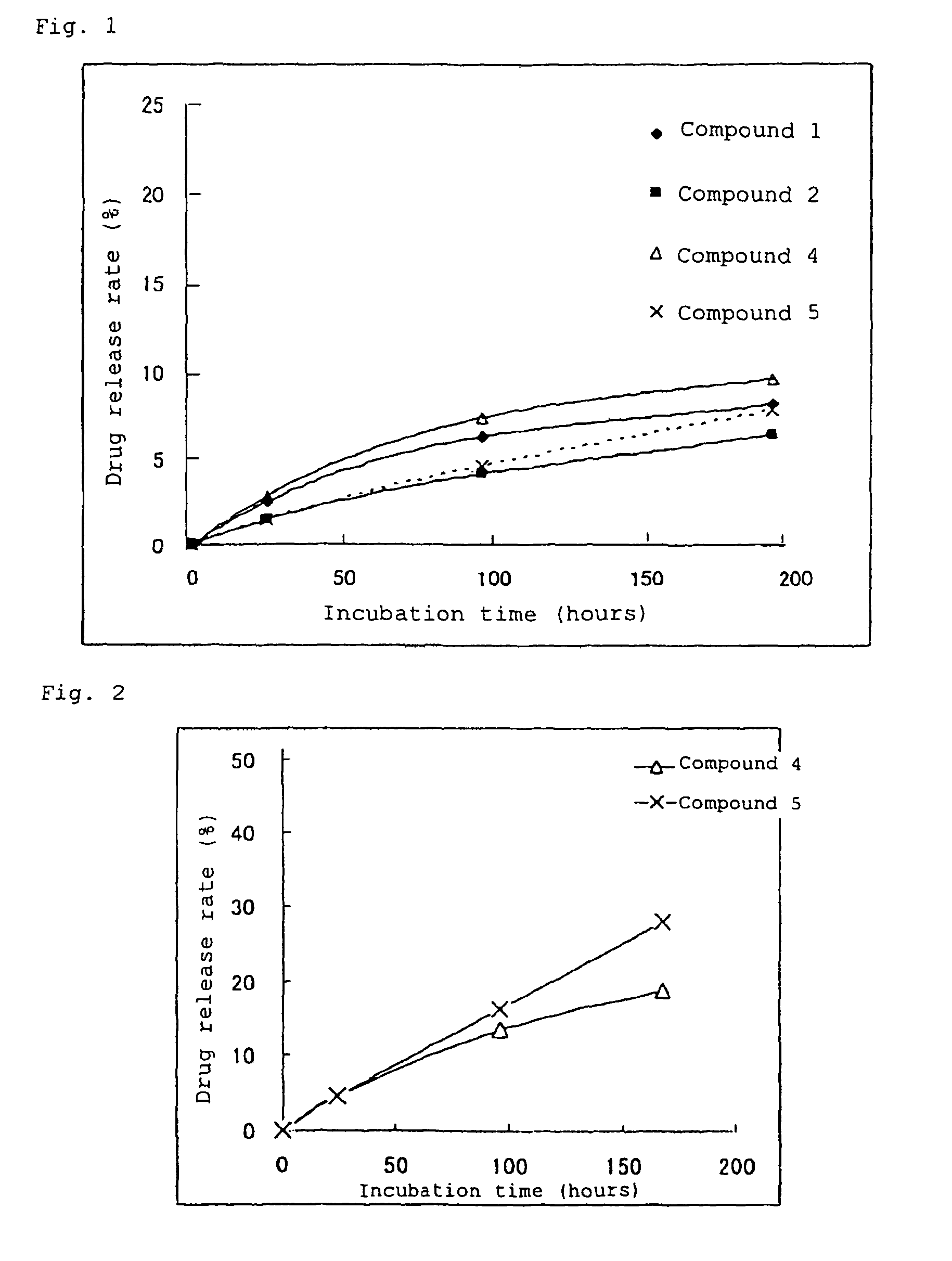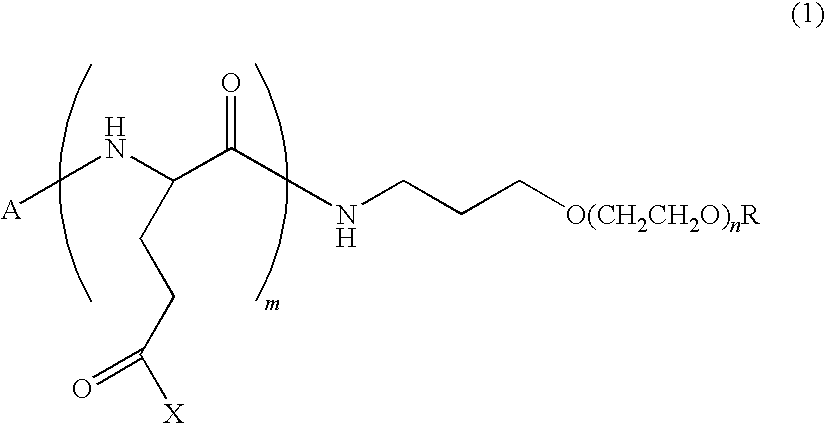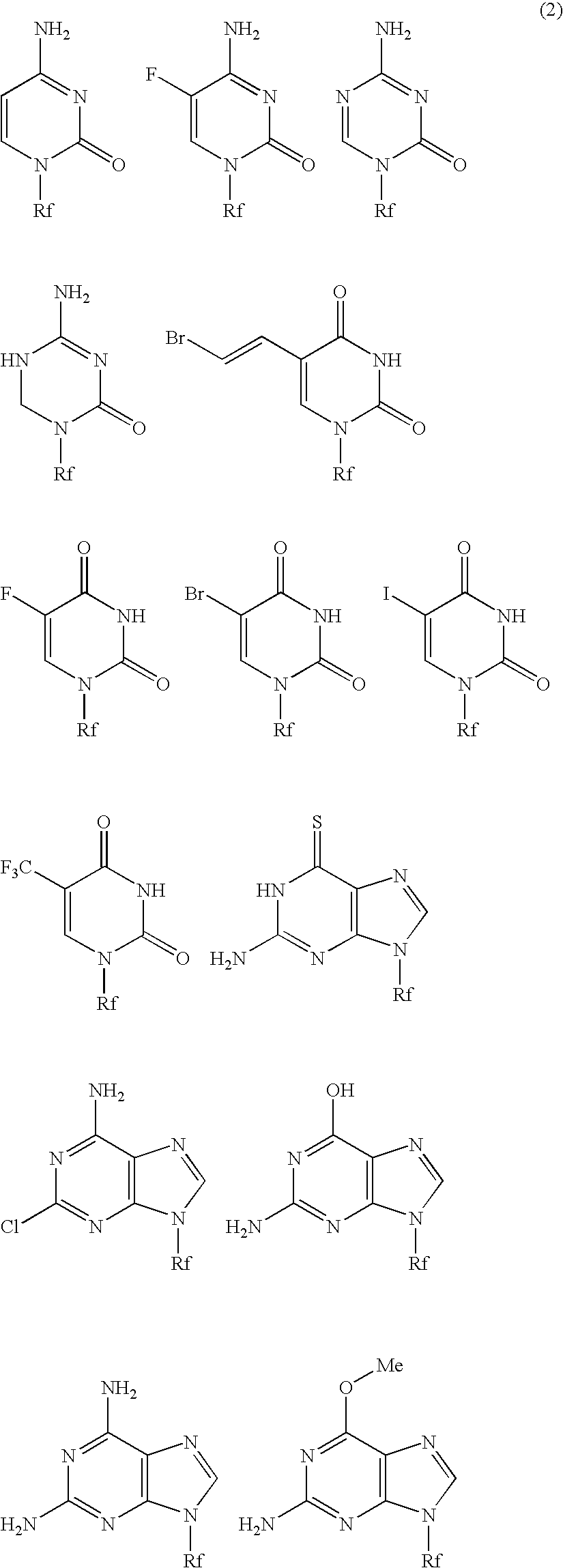High-molecular weight derivative of nucleic acid antimetabolite
a nucleic acid and antimetabolite technology, applied in the direction of peptides, drug compositions, peptides, etc., can solve the problems of inability to repeatedly administer high molecular weight derivatives as drugs, and the therapeutic effect in clinical practice may be greatly affected by individual differences in patients, so as to slow down the release of nucleic acid antimetabolite over a long time, the effect of improving the effect of drug resistan
- Summary
- Abstract
- Description
- Claims
- Application Information
AI Technical Summary
Benefits of technology
Problems solved by technology
Method used
Image
Examples
reference example 1
Synthesis of N-Acetylation Product of Block Copolymer of Monomethoxypolyethylene Glycol Having a Molecular Weight of about 12000 and Polyglutamic Acid Having a Polymerization Number of about 26
[0111]A polyethylene glycol having a methoxy group at one end and a 3-aminopropyl group at the other end (SUNBRIGHT MEPA-12T, manufactured by Nippon Fat & Oil Co., Ltd., average molecular weight 12000, 7.74 g) was dissolved in dimethylsulfoxide (160 mL), and γ-benzyl-L-glutamate N-carboxylic acid anhydride (BLG-NCA, 5.1 g; 30 equivalents relative to the polyethylene glycol) was added thereto. The mixture was stirred overnight at 30° C. The reaction liquid was added dropwise to a mixed solvent of isopropyl ether-ethanol (4:1, 2.4 L) under stirring, and the resulting mixture was stirred for another one hour. A precipitate separated out there from was collected by filtration, and was washed with a mixed solvent of isopropyl ether-ethanol (4:1, 400 mL). The obtained product (11.50 g) was dissolved...
reference example 2
Synthesis of N-Acetylation Product of Block Copolymer of Monomethoxypolyethylene Glycol Having a Molecular Weight of about 12000 and Polyglutamic Acid Having a Polymerization Number of about 26
[0113]The title compound was obtained according to the method described in Reference Example 1, by using 29.1 equivalents of BLG-NCA relative to the polyethylene glycol.
[0114]The average polymerization number of glutamic acid (the number of carboxyl groups) per molecule of the subject compound, based on the titration value obtained by using an aqueous solution of sodium hydroxide, was 26.72.
reference example 3
Synthesis of N-Acetylation Product of Block Copolymer of Monomethoxypolyethylene Glycol Having a Molecular Weight of about 12000 and Polyglutamic Acid Having a Polymerization Number of about 26
[0115]The title compound was obtained according to the method described in Reference Example 1, by using 30 equivalents of BLG-NCA relative to the polyethylene glycol.
[0116]The average polymerization number of glutamic acid (the number of carboxyl groups) per molecule of the subject compound, based on the titration value obtained by using an aqueous solution of sodium hydroxide, was 26.70.
PUM
| Property | Measurement | Unit |
|---|---|---|
| reaction temperature | aaaaa | aaaaa |
| reaction temperature | aaaaa | aaaaa |
| temperature | aaaaa | aaaaa |
Abstract
Description
Claims
Application Information
 Login to View More
Login to View More - R&D
- Intellectual Property
- Life Sciences
- Materials
- Tech Scout
- Unparalleled Data Quality
- Higher Quality Content
- 60% Fewer Hallucinations
Browse by: Latest US Patents, China's latest patents, Technical Efficacy Thesaurus, Application Domain, Technology Topic, Popular Technical Reports.
© 2025 PatSnap. All rights reserved.Legal|Privacy policy|Modern Slavery Act Transparency Statement|Sitemap|About US| Contact US: help@patsnap.com



